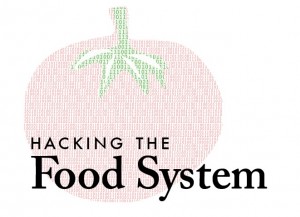[Hacking the Food System is an online conversation exploring how technology, information and data can change the food system status quo. Join the conversation below, on Twitter (hashtag #foodtech), or Facebook.]
There are still a few resources that we, as a society, continue to treat as common resources, such as air and water. But not many, and even those two are under stress.
There are some calls for water to be treated more like oil, like the recent arguments by Willem Buiter, the chief economist of Citigroup:
I expect to see a globally integrated market for fresh water within 25 to 30 years. Once the spot markets for water are integrated, futures markets and other derivative water-based financial instruments — puts, calls, swaps — both exchange-traded and OTC will follow. There will be different grades and types of fresh water, just the way we have light sweet and heavy sour crude oil today. Water as an asset class will, in my view, become eventually the single most important physical-commodity based asset class, dwarfing oil, copper, agricultural commodities and precious metals.
We have treated food as a commodity for centuries, however, and the dangers associated with that no longer surprise, but are instead simply taken as a given. Farmers farm, and their output is swept into global markets managed by multinational corporations, converted into foodstocks, and distributed as the money flow decides. We have lived in market-based economies so long that we almost cannot imagine alternatives.
However, the growing local food movement has started to bring human scale back into how we think about food. Instead of simply accepting the global agribusiness markets as being fundamental, people have started to see them as social conventions organized around certain political and financial conventions. The worldwide food markets that dominate the production and distribution of food are not gravity: it is a part of the current social contract, and no more a given of the universe than driving on the right hand side of the road, or starting the calendar from the birth of a certain religious figure approximately 2000 years ago.
So, what is the alternative, if any?
A philosophical shift is happening, at an almost invisible aspect of our society, where wholesome and safe food is being reconsidered as a foundation of life, like other rights we have come to expect like free speech, clean air and water, and public education. (Note that these other aspects of a free society are under stress, with economic forces leading to dramatic impacts on US education, and the wholesale fear of terrorism curtailing free speech. And I won’t even start on ecology.)
A growing but diffuse food movement is trending toward a return to local and personal food production. It is my belief and hope that the use of purpose-built social tools — food tech — will accelerate the trend toward personal and regional food self-sufficiency. Dozens of applications are being developed that meet needs of farmers, distributors, restaurants, food producers, and consumers. In time, more and more functionality will come on line, until an inflection point will be passed, and critical mass in the population will be reached. I estimate it will require 20 million or more dedicated participants before a real food net will be large and diverse enough to really challenge the existing food system.
I believe that we will start to see a new factor: social food cooperatives. Social tools will lead to an alternative food system to the extent that people choose to spend more time involved in the production and distribution of food. This does not mean that everyone will become a full-time farmer, but average people will begin to dedicate more time to local food production and distribution than they have in the past 50 years. This could entail growing food in a greenhouse with five other families, working at a food coop, or keeping chickens on the roof of your New York City brownstone and trading eggs for produce with neighbors. But it will start to become a mainstay of post-industrial life for many.
The social systems that existed in the pre-industrial era are lost to us, so we will have to regenerate them using low cost, low threshold social technologies. We don’t have the ability to recraft the world as a series of rural villages, where people knew the dairy farmer, and the greengrocer knew exactly where every pumpkin was grown. But we can emulate that knowledge using social networks and big data.
In the final analysis, we will create a new food system through our involvement in each other, and where food becomes a social object that brings us together, a secular sacrement, instead of a market commodity managed for maximum profits by corporations.
__________________
Stowe is an internationally recognized authority on social tools and their impact on media, business, and society. He is best known for his commentary on the social revolution at www.stoweboyd.com, and his public speaking on his research on work media, social business, the social web, publicy, social cognition, networked identity, and the future of work. Stowe is at work on a new book about the rise of a socially augmented world, called ‘A Liquid, Not A Solid; A City, Not A Machine’.
A longer, first-person bio can be found here, and contact info, here.




